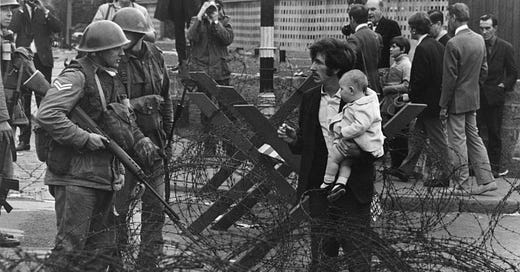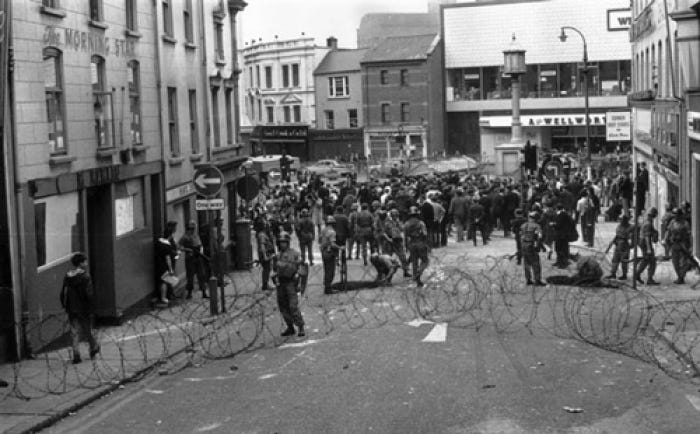In September 1969, people were in fits of laughter in every home in the UK when Monty Python’s Flying Circus aired on the BBC. Things weren’t so jovial over in Northern Ireland, as bombings and shootings continued to frighten communities, as the trouble continued to escalate.
On the 1st of September 1969, Seán G. Ronan (Assistant Secretary, Department of External Affairs) wrote a letter to Dr Nicholas S. Ó Nualláin (Secretary, Department of the Taoiseach) enclosing a copy memorandum of a conversation between Ian Mikardo (M.P.) and Fintan M. Tallon (Irish Efficiency Centre) concerning a visit by a British Labour Party Executive Committee delegation to James Callaghan(British Home Secretary), to discuss issues relating to Northern Ireland, such as political and electoral reforms.
What was quite interesting about this letter was the note around the ending of partition. He writes;
Mr Callaghan also informed the Delegation that in his personal view the Irish government would not immediately want the ending of Partition and the creation of their own "Bogside”. But he felt that the Irish Government, like the British Government, believed that partition would be an anomaly within a very short period, once Britain and Ireland became members of the Common Market. In this respect, he mentioned that it was his view (Mr Callaghan's view), and the view of many of his colleagues in the Cabinet, that there was nothing sacrosanct about the existing Border and if the Unionist and/or Protestant minority in the North felt that they had the right to vote in favour of remaining within the United Kingdom, it was true to argue that there was a similar right for the majority, say in Derry and elsewhere, where a geographical unit existed to vote to opt out of Northern Ireland and into the Republic. He personally felt however that this might not be wise in the ultimate since if the minority in the North were given equal rights in respect of housing and jobs, that same minority, in a relatively short space of time, might no longer be a minority and the number of diehards could be proportionately lower. However, he did make it clear that the existing Border was negotiable if a substantial volume of opinion in any area wished to opt-out. He did feel it unlikely that the Irish Government would wish to consider negotiations on that matter at the present or in the immediate future.
It was quite clear that both parties acknowledge that there was potential for something to give, either way, but they were both apprehensive, and possibly scared, of any potential fallout that could exacerbate the current problem. You can read the letter in full via the National Archives, Ireland here.
On the 4th of September 1969, the Derry Citizens' Defence Association (DCDA) published an edition of its Newsletter (Vol.15). It was common for informal publications like this to be circulated to update supporters of any developments. There were 3 key points in the newsletter; expressing solidarity with the people of Belfast, the significance of the barricades and also a reference to the USC still being seen in the Creggan area. You can read the newsletter in full here.
Members of the Northern Ireland Government held a meeting with the Northern Ireland Committee of the Irish Congress of Trade Unions at Stormont on the 8th of September. A joint statement was issued following the meeting, with key reforms and inquiries mentioned in the statement;
Parliamentary Commissioner.
Commission to investigate complaints against local authorities and public bodies.
Points scheme for allocation of local authority housing.
Reform of local government boundaries.
Reform of local government franchise.
Community Relations Board
Release of Internees.
Appointment of Minister for Community Relations.
Amnesty for firearms.
Mission from United Kingdom departments to assess the economic and industrial prospects.
Inquiries set up included;
The Cameron Commission
The Hunt Inquiry into the organisation, recruitment structure and composition of the Police in Northern Ireland.
The Scarmann Tribunal.
On the same day, another life was lost in Belfast. Mr John Todd, 29, was shot during street disturbances in Alloa Street, Lower Oldpark, Belfast. It had been reported that there was a disturbance between republicans and loyalists, and Mr Todd had been shot dead during the altercations.
The 9th of September saw the Northern Ireland Prime Minister announce that a temporary peace line would be erected in Belfast between Catholic and Protestant areas (Falls and Shankill areas) to try to prevent rioting. The British Army completed the peace lines in Belfast the following day, whilst also recognising the ‘no-go’ areas of Derry. It’s interesting that the peace line was constructed as a temporary measure to stem the rioting, and even though they replaced the temporary structure over the following years, this is actually a permanent feature still in place today.
Alongside the addition of the peace line, it was also agreed upon during a meeting of the Joint Secretary Committee at Stormont Castle that additional measures would also be brought into play to help stem the rioting. A system of vehicle control would be brought into place, where no cars would be allowed to enter or leave a designated area of Belfast from 9 pm to 6 am. It was also agreed that another battalion would arrive in Belfast and that more RUC officers were being made available by cutting down on stationary guard duty at certain key points in Belfast.
On the 12th of September, the long-anticipated Cameron Report into disturbances in Northern Ireland was published. The Cameron Inquiry had been set up on the 15th of January 1969. In the report, he found some evidence of cross-membership of the USC and loyalist paramilitary organisations. He reported that in Major Ronald Bunting's Ulster Protestant Volunteers (UPV), there was definite evidence of dual membership by Special Constables, of which he said "we consider highly undesirable and not in the public interest". He also remarked that although "recruitment is open to both Protestant and Roman Catholic: in practice, we are in no doubt that it is almost if not wholly impossible for a Roman Catholic recruit to be accepted." The Cameron Report described the B-Specials as "a partisan and paramilitary force recruited exclusively from Protestants."
The prime Minister, Major JD Chichester-Clark, released a statement on the report. In his statement he stated;
The Cameron Report is a document of great importance. But far more important is how we respond to it. Various interests can, if they wish, rake through this lengthy report to find more fuel for the fire of controversy they seek to keep ablaze. If that is their approach, there is nothing we can do to stop them. What we can do, as a Government, is to give a lead to public opinion through what we do ourselves. We do not fear the truth. Indeed, our search for it by no means ends with the publication of this Report. It is self-evident that in the past all of us have made mistakes. What do we do now? profit from these mistakes, or sink into a welter of recriminations which ensures that they will be repeated? It is our hope that people will consider Lord Cameron's Report as a whole, and ask themselves "How can I, by my personal example, or by using my shred of personal influence I may possess, help to remove the distrust and suspicion which poison our society? How can I ensure that such things as Lord Cameron was inquiring into do not happen again?
On the 20th of September, Irish Prime Minister Jack Lynch gave a speech in Tralee, entitled 'The Situation in the Six Counties of North-East Ireland: the basis of our thinking and policy'. It was in this speech that Mr Lynch made a few interesting quotes from historical figures.
"Whatever Ulster’s right may be, she cannot stand in the way of the whole of the rest of Ireland. Half a province cannot impose a permanent veto on the nation. Half a province cannot obstruct forever the reconciliation between the British and the Irish democracies and deny all satisfaction to the united wishes of the British Empire" - Winston Churchill.
"Ireland is a nation; not two nations, but one nation. There are few cases in history, and as a student of history in a humble way, I myself know none, of a nationality at once so distinct, so persistent, and so assimilative as the Irish" - Mr Asquith (former British Prime Minister).
On Saturday the 27th of September, there was serious violence in parts of Belfast. Following a rally in the Ulster Hall, a group of Loyalists began to attack Catholic homes in Coates Street, West Belfast. Petrol bombs were thrown over the Peace Line from Sackville Street, with five Catholic homes were destroyed by fire. Royal Ulster Constabulary (RUC) officers and British Army soldiers were present in the area but were unable to prevent the attack. When a loyalist crowd approached the Catholic Unity Flats, shots were fired into the crowd and at least one person was injured.
Violence continued in Belfast during the night. A Republican crowd attacked an RUC station in Hastings Street, Belfast, as well as two churches, one Catholic and one Protestant, being damaged in the attacks.
I found some great footage of Belfast in September 1969 that you can watch here. In the video, there’s a young woman speaking about the ability of Catholics and Protestants to live together in peace and she makes some very good points. It’s at around 19:30 in the video.
Following the latest outbreak of violence over the weekend, it was announced that a further 700 British troops would be sent to Northern Ireland to reinforce the army presence in the region (bringing the overall deployment to 7,500).
A debate took place in Stormont on the Cameron Report on the 30th of September, with a large protest of Loyalists, estimated at 5,000 people, taking place outside the Stormont building. Some MPs reported being threatened and intimidated by individuals in the crowd.
To me, it seemed as though September represented a time when the governments, both British and Irish, were starting to realise that this conflict wasn’t one that would pass into the dead of night, but rather one that was just beginning. Tensions were building across all communities in Northern Ireland.






